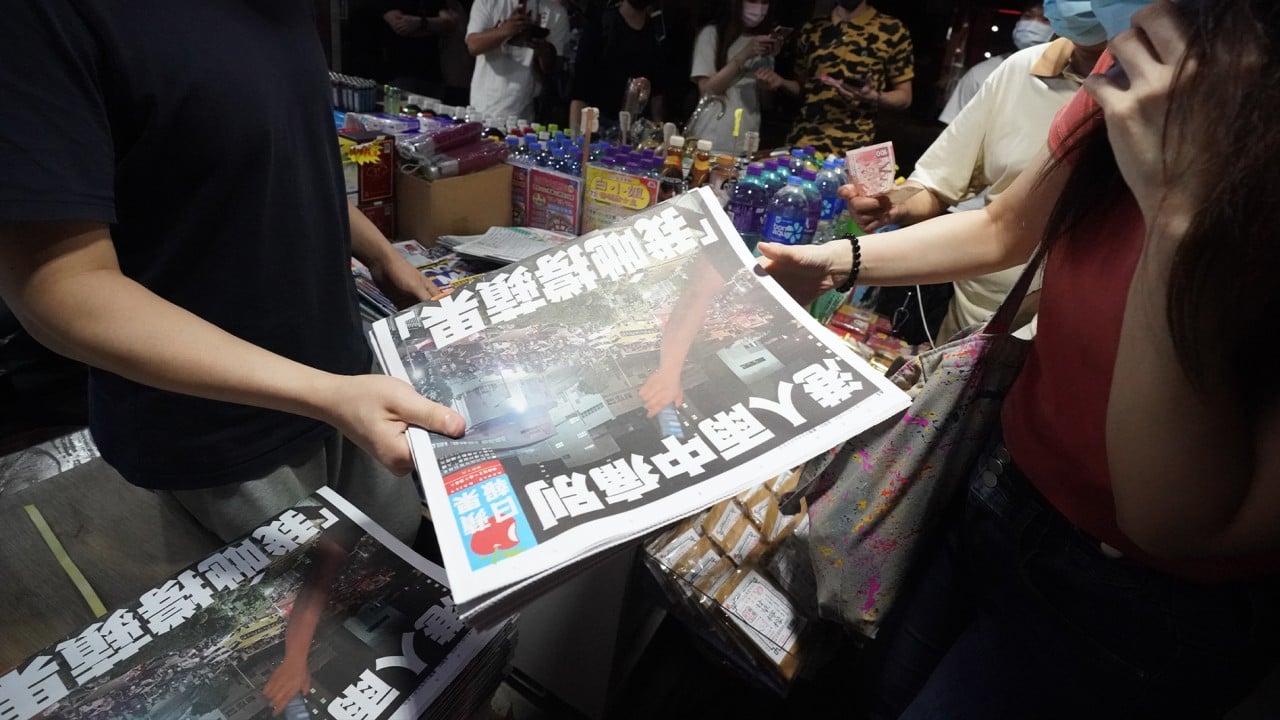
The morning after: Apple Daily supporters brave drizzling rain, express despair while snapping up final edition
- The tabloid-style newspaper, a fixture for 26 years, ended operations at midnight following a series of arrests made under the national security law
- ‘I feel powerless … There’s nothing that Hongkongers can do about it’, one woman says while buying five copies at a Mong Kok news-stand
Hongkongers were still flocking to purchase copies of the 26-year-old Apple Daily’s final edition as residents made their way to work on Thursday morning, with many supporters emotional as they queued amid drizzling rain.

06:28
Hong Kong tabloid Apple Daily ceases operations after top executives arrested, assets frozen
At around 8am, at a Mong Kok news-stand at the junction of Argyle Street and Sai Yeung Choi Street, the owner, surnamed Ng, told the Post she had ordered as many as 10,000 copies of the final edition and had already sold more than 1,000 as of 8am.
Supporters kept arriving, and queued patiently despite the rain as Ng and her staff busily collected HK$10 and HK$20 bills – with many purchasing more than one copy of the HK$10 paper. One Post staff member saw the final edition being sold for HK$15 at another location. Social media reports suggested that was happening elsewhere.
“Thank you! Just take it yourself!” said a staff member, her hands full of cash.
Hong Kong’s forbidden fruit and the national security law: the rise and fall of Apple Daily and founder Jimmy Lai
Headlined “Hongkongers reluctantly bid farewell under the rain: ‘We support Apple Daily’”, the paper said it printed 1 million copies of the final edition.
“We have fought a good war. Even though there are regrets, we are thankful about having stood steadfast with Hongkongers until the end,” a line from its front page story read.
One 48-year-old supporter surnamed Ha, who returned to buy five more copies of Apple Daily after having bought five at the news-stand earlier, said he believed “the voice that represents Hong Kong has disappeared”.
“It is a day worth remembering,” he said. “I won’t read other newspapers after today. It’s meaningless to read news that I think will be done in cookie-cutter style in the future.”
A woman surnamed Yau also bought five copies to show her support. “I feel powerless,” she said. “I hope Apple Daily will start over soon. There’s nothing that Hongkongers can do about it. I couldn’t even sleep last night.”
On social media, many said they had been unable to get a copy of Apple Daily on Thursday morning. At a news-stand in Tuen Mun, where more than 400 copies had been ordered, most were gone by just after 8am.
Defender of freedoms or defiler of national sovereignty? What exactly was Hong Kong’s Apple Daily?
A student there surnamed Cheung, 15, grabbed five copies for herself and her friends. “[The paper was already sold out at] all other places I’ve been. I’ve been reading Apple Daily for a long time. It’s such a shame that today is their last edition.”
But a man surnamed Du, who was buying a copy of the rival Oriental Daily, said he did not support Apple Daily as he believed it was “illegal”.
“I bought Oriental Daily because I am a Chinese. Hong Kong belongs to China,” he said.
Queues were already forming at the Mong Kok news-stand before midnight on Thursday, with many waiting for the first delivery of the swansong edition that arrived at about 1am.
Some in the queue chanted: “Hongkongers, add oil!” and “Mr [Jimmy] Lai, hang in there” – referring to Apple Daily’s jailed founder Jimmy Lai Chee-ying, who is facing trial on a series of national security law charges.
On a Thursday morning radio show, Chinese University journalism and communications professor Clement So York-kee said the newspaper’s reporting had improved in recent years and attracted many with its unique brand of “advocacy journalism”.
“Whether that [type of journalism] can succeed depends on the societal situation, whether there are controversies [to report on]. If that’s the case, some media outlets will put more of their own views into the reporting as a form of advocacy journalism,” So said.
Lights out at Apple Daily: Hongkongers queue for hours to buy newspaper’s final issue
Liu Sair-ching, chairman of the Coalition of Hong Kong Newspaper and Magazine Merchants, meanwhile, said he believed Apple Daily readers would not switch to other papers after its closure, meaning news-stand owners would take a hit in the coming months.
Washington-based NGO the Hong Kong Democracy Council on Thursday said the closure of Apple Daily came because Hong Kong and Beijing were “desperate to put an end to [it]”, adding that “truth and truth-tellers have always been the Achilles heel of authoritarian regimes”.
Britain and the European Union also criticised the paper’s closure, saying it demonstrated how authorities were using the national security law to stifle opposition voices.
Earlier in the week, Beijing had hit back at similar criticisms, saying no “foreign country or individual had the right to meddle with Hong Kong issues”.



